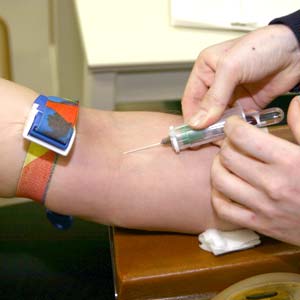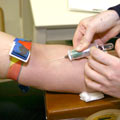Description of the test
Cholesterol testing analyzes the level of cholesterol (a fatty substance) in the blood. A technician in a hospital or clinic takes a sample of blood using a needle. The test takes less than 10 minutes to complete.
Naturally found in the body, cholesterol has many important roles. Cells use it to make protective outer coverings and hormones. Cholesterol can come from two sources: The food you eat and your own body, which produces some cholesterol.
How often should the test be performed?
Your age, health, and risk of having cardiovascular disease will determine how frequently you need this test. For most healthy people without any other medical conditions, it is recommended that you have your first cholesterol test at the age of 40 for men and 50 for women and every 5 years afterwards. More frequent testing may be recommended if you:
- have certain conditions (e.g., diabetes, high blood pressure, abdominal obesity)
- have a family history of high cholesterol or heart disease
- are currently taking cholesterol-lowering medications
Why is this test performed?
A high level of LDL (bad) cholesterol in the blood is a risk factor for certain serious conditions. Heart attacks and stroke are two conditions associated with high LDL cholesterol levels. Higher levels of HDL (good cholesterol) can help protect against heart disease and stroke. Cholesterol testing is important because your doctor can:
- determine your risk for serious conditions
- treat high LDL cholesterol through a combination of diet, exercise, and medication
- monitor the effectiveness of medication you are taking to lower your cholesterol levels
Are there any risks and precautions?
Although blood tests are very safe, you may experience:
- slight bruising or tenderness where the needle enters the vein
- infection (if the area was not properly disinfected before the sample was taken)
- excess bleeding from the area that was punctured
People with bleeding disorders or anyone taking medication that reduces the ability of the blood to clot (e.g., warfarin, ASA, or other anticoagulants) should tell the technician before the blood samples are taken. These conditions and medications may require special attention at the time of testing.
Tell your doctor or prescriber about all prescription, over-the-counter (non-prescription), and herbal medications that you are taking. Also tell them about any medication allergies and medical conditions that you may have.
Ask your doctor or pharmacist whether you need to stop taking any of your medications before the procedure.
What happens during the test?
Blood is collected into one or more small vials labelled with your information. The technician should wear fresh latex gloves and use a new, single-use needle for each procedure.
A technician or nurse wraps a wide elastic band around your upper arm to help locate the vein. Once the vein is located, usually on the inside of your elbow, the area is disinfected using alcohol swabs. The technician inserts a needle into a vein and pushes a vial onto the needle to collect the blood. The elastic band is removed and after the blood is collected, the needle is removed and discarded. You will have to hold a small piece of cotton over the area until bleeding stops. A small bandage will be applied to hold the cotton in place.
The test is almost painless for most people, although feeling a slight pinch when the needle is inserted is normal. The vials of blood are then sent to a laboratory to be tested.
How should I prepare for this test?
You may be asked to fast before the test. If so, you should not eat or drink anything except water at least 9 to 12 hours before the test. If you have had a radioactive scan in the past week, tell your doctor as this may affect the results of an LDL test.
Wear a sleeveless or loose-sleeved top so you can easily expose your upper arm.
Arrange for someone to drive you home from the hospital, office, or clinic.
What can I expect after the test?
Slight tenderness may occur where the needle was inserted.
Results
Your doctor can discuss your results with you. Ask your doctor when your test results should be available.
Your results are given as a number. Generally, the lower your risk of cardiovascular disease, the more acceptable a higher level of cholesterol is. Your number should be less than the target number in your risk group for cardiovascular disease. If your number is higher than the target number for your risk group, you may need treatment for high cholesterol.
Your doctor can assess your risk of having cardiovascular disease. People who have had a stroke or heart attack, or people with diabetes or peripheral arterial disease are at the highest risk of developing cardiovascular disease.
It is important to note that high levels of good (HDL) cholesterol are good, while high levels of bad (LDL) cholesterol show that you may be at risk of developing serious health problems and so may require treatment.
All material copyright MediResource Inc. 1996 – 2024. Terms and conditions of use. The contents herein are for informational purposes only. Always seek the advice of your physician or other qualified health provider with any questions you may have regarding a medical condition. Source: www.medbroadcast.com/procedure/getprocedure/Cholesterol-Test

A patient having blood collected for a cholesterol test






